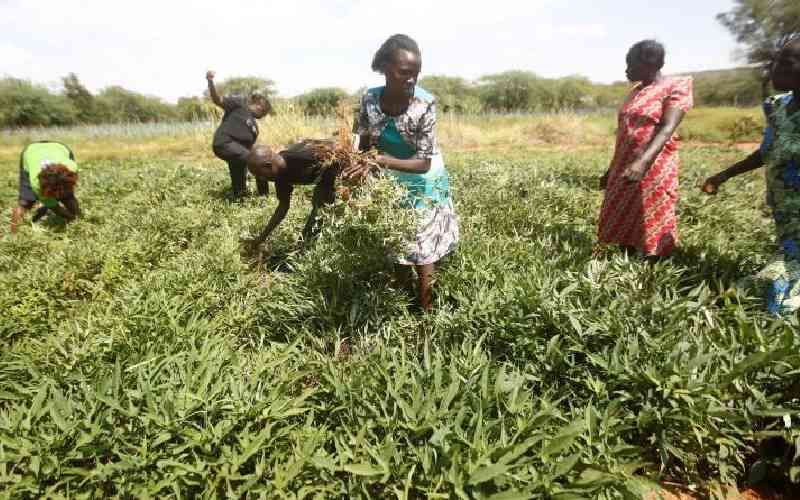
As of August, the number of Kenyans facing food insecurity rose to 13.6 million, a troubling increase of 640,000 people in just three months, despite a slight decrease from previous peaks. This crisis is largely driven by soaring food prices, contributing significantly to the country's overall inflation rate, which fell to 3.6 per cent in September.
Amid these alarming statistics, the role of women in agriculture, particularly their land rights, emerges as crucial. Women, who play a central role in food production across Kenya, are often marginalised in terms of land ownership. This undermines their ability to contribute fully to food security, leaving millions vulnerable to hunger.
Two years ago, Mercy Amadi worked as a subsistence farmer, growing cereals, sweet potatoes, yams, vegetables, and bananas. Her harvest not only sustained her family but also generated surplus for the local market and her children’s secondary school fees.
“Every meal we ate came from the work of my hands. It made me proud,” recalls Amadi, reminiscing about watching her children play in the lush banana groves—a source of both nourishment and pride.
However, everything changed when her husband decided to convert their one-acre plot into a sugarcane plantation.
“Before the sugarcane, the farm felt like a sanctuary,” she laments. “Now, it's just rows of sugarcane, and every day I worry about our next meal.”
The economic promise of sugarcane farming— promising high returns— was alluring. However, sugarcane takes months to mature, leaving Amadi’s family without immediate sustenance.
“The money the buyers talked about sounded good,” Amadi admits, “but I knew it wasn’t that simple. Sugarcane takes time, and we couldn’t eat it while it grew.”
She tried to persuade her husband not to uproot the food crops, but her objections were dismissed.
“I tried to explain that we needed food on our table more now than we needed money in the future,” she recalls, her voice tinged with frustration. Her objections were dismissed, and she lost her user rights to the land— rights she had always assumed were secure as a wife.
“I felt powerless,” Amadi confesses quietly.
With the bananas uprooted for sugarcane, their once-thriving farm became a monoculture, barren of immediate sustenance. Forced to buy food they once grew, Amadi's family faced an uncertain future.
With the bananas uprooted for sugarcane, their once-thriving farm became a monoculture, barren of any immediate sustenance. Forced to buy food they once grew, Amadi’s family faced an uncertain future.
“We have to buy everything,” she explains. “It was hard, so hard.”
The emotional toll on Amadi was immense. She struggled to reconcile her identity as a farmer with the new reality.
“Farming was my life. It’s what I knew, what I was good at. To have that taken away... it was like losing a part of me,” she says.
To cope, she found small ways to reclaim her sense of purpose, planting vegetables in the few spaces left untouched by the sugarcane. “It wasn’t much, but it was something. It reminded me that I was still a farmer,” she says, her voice filled with quiet determination.
Economic impact of monoculture
Amadi’s story is not unique. Across Kenya, the shift from diversified smallholder farming to monoculture cash crops like sugarcane is increasingly common, driven by promises of higher profits. However, this shift often leaves smallholder farming families vulnerable to cycles of food insecurity.
Economic and Environmental Impact
Economically and environmentally, monoculture farming comes at a cost. It depletes soil nutrients, disrupts ecosystems, and increases reliance on chemical fertilisers and pesticides, which degrade the land even further. In contrast, diversified farming — where crops like vegetables, legumes, and cereals are grown together, enriches the soil and provides year-round harvests, contributing to both household and national food security as it also creates a buffer against market fluctuations and environmental shocks.
Women’s land rights key to solving Kenya’s food crisis
Yet women like Amadi face additional barriers. Despite comprising 60 per cent of those engaged in agriculture and responsible for 70-80 per cent of food production, they own only 2 per cent of the land. Women manage 40 per cent of the small-scale farms and only 1 per cent of all the registered land titles are in their names and between 5-6 per cent are held jointly with their partners or other family members. This disconnect limits their ability to make long-term investments in sustainable farming practices.
"The assumption is that women will access land through marriage. But in reality, they only gain user rights, not true ownership,” explains Professor Ruth Oniang’o, a food and nutrition expert. “This discourages them from investing in land they do not control.”
“These cultural barriers trap smallholder women farmers in a state of 'permanent exclusion,' preventing them from making meaningful decisions about land use," adds Prof. Oniang'o. "Yet, they are still expected to feed their families, including the very men denying them their land rights!"
Though Kenya’s constitution provides for equal rights to land ownership, cultural and legal barriers continue to exclude women from securing their rightful stake in land. In many communities, patriarchal customs dictate that land ownership passes exclusively through male inheritance, leaving women with temporary user rights at best.
Legal reforms in Kenya, such as the Matrimonial Property Act, theoretically allow women to claim joint land jointly acquired during marriage. However, proving joint ownership remains complex, particularly in unregistered or customary marriages. In court disputes, women must prove their contribution to property acquisition, but non-monetary contributions, often undocumented, are undervalued by courts, which tend to prioritize financial input—disadvantageing women engaged in unpaid domestic work.
"The process of succeeding land is long and expensive, with lawyers charging high fees, limiting the number of women who can afford it. Women's contributions to property acquisition, often in unpaid farming and domestic work, are undervalued in court," notes Charles Rading from the National Land Commission in Kakamega County. "This perpetuates their exclusion from land ownership." Additionally, the Succession Act restricts widows' inheritance rights, particularly if they remarry or have no children, further disenfranchising women from the land they have worked for years.
According to the Kenya Land Alliance, women often lack representation in land governance bodies, limiting their ability to advocate for their rights. Many urban and rural women are also unaware of land laws and registration processes, perpetuating their exclusion from land ownership, one of the most crucial factors of production.
Breaking Barriers: Success and Solutions
Despite these challenges, women like Edith Khavere are reclaiming their rights to land and, in doing so, have transformed their lives and their communities. After a challenging divorce, Khavere purchased a one-acre plot, determined to take control of her future. "Owning land changed everything for me," she asserts. I could invest in it without fear of losing it. It gave me security to invest in agriculture and feed, not just my family but also my community.”
Khavere’s farm grew to become a key supplier to local markets, and over time, she was able to retire from her teaching job to focus entirely on agriculture. "The security of owning my land gave me the confidence to expand. Now, I’m not just feeding my children—I’m feeding my community."
Khavere’s success underscores the potential of securing land rights. When women have control over land, they invest in sustainable practices,diversify crops, and improve household nutrition and income. This not only strengthens local economies but also enhances national food security. "When women have control over land, they can truly contribute to food security and economic growth," Khavere says.
Empowering women to feed Kenya
Dr Makini, Deputy Director General of Crops at the Kenya Agricultural and Livestock Research Organisation (KALRO), emphasizes the connection between women’s land rights and food security.
"Women are responsible for 70-80 per cent of food production, particularly in subsistence farming.However, their contributions to food security are hindered by limited land rights. Ownership and control of land extend beyond mere access; they encompass the ability to decide on land use, financing, and cultivation. Given that women make up 50.3% of Kenya’s population, their exclusion from land ownership has significant implications for the country's economic performance and food security,”
“Women’s limited land rights reflect broader gender inequalities that impede their overall empowerment and capacity to contribute to food security. It also slows the process of land utilisation in many households, negatively affecting food production.Men are the ones invited to meetings and seminars where they learn about new technologies and innovations in agriculture because of their secure land tenure status, yet it’s the women who actually do the farming. Without secure land tenure, women are excluded from these opportunities, leaving them at a significant disadvantage.”
Furthermore, secure land rights enable women to diversify crops, produce cash crops, and generate income, which they can reinvest in their families and communities. This, in turn, improves household nutrition and economic stability, contributing to national food security. According to the Food and Agriculture Organization (FAO), if women had the same access to productive resources as men, farm output would increase by 20 to 30 percent.
“For many women, farming is about feeding their families. But when it shifts to cash crops, men get involved because they’re more interested in making money. Even when a food crop becomes a cash crop, like indigenous vegetables, men start to take over,” says Prof Oniang’o.
Prof. Oniang’o further elaborates, citing the example of indigenous leafy vegetables: “It was mostly women growing them, but once men saw the profit potential, they got involved in picking, marketing, and even growing. Now, these vegetables are making their way to cities, and you see men actively participating.”
While food security can be achieved through production or purchasing, when women farmers increase productivity, they earn income by selling surplus crops. “Income allows women to buy diverse foodstuffs and engage in income-generating activities like poultry and dairy farming, enhancing resilience against food insecurity. However, limited land rights restrict women to low-profit crops, while secure tenure enables them to diversify and improve household nutrition and income.” asserts Dr. Makini
However, achieving equitable land rights requires addressing cultural and legal barriers. Initiatives like the Digital Land Governance Programme are pivotal, digitising land records, and empowering women in land governance and decision-making.
Ms. Husna Mbarak, the DLGP manager at FAO, emphasizes the importance of recognizing women as the largest users of land in small-scale agriculture in land governance. Kenya’s Constitution mandates gender representation in community land management committees and allows women to be registered as independent landowners.This legal shift enables women to vote, hold leadership positions, and participate in land transactions, which require both spouses to be present before county land boards. The program has registered over 70 community lands, empowering women to take active roles in land governance. The program is supporting the government in creating a gender policy for the land sector, promoting gender-inclusive planning, and improving women's digital literacy for better access to digitized land records via the Ardhi Sasa system. These initiatives aim to boost women's participation in land governance and decision-making at local and national levels.
For Kenya to fully tap into the potential of its women farmers, the barriers to land ownership must be addressed. While there have been robust legal reforms to ensure women can claim, inherit, and register land in their names. Public awareness campaigns must follow to educate both men and women about these rights and the long-term economic benefits of secure land ownership.
Securing land rights for women isn't just a legal imperative— its a pathway to empowering women as key drivers of economic growth and food security in Kenya. Amplifying their voices and advocating for policy reforms can ensure that women like Mercy Amadi and Edith Khavere contribute fully to sustainable agriculture and resilient communities.
This article was produced as part of the Aftershocks Data Fellowship (22-23) with support from the Africa Women’s Journalism Project (AWJP) in partnership with The ONE Campaign and the International Center for Journalists (ICFJ).
 The Standard Group Plc is a multi-media organization with investments in media platforms spanning newspaper print
operations, television, radio broadcasting, digital and online services. The Standard Group is recognized as a
leading multi-media house in Kenya with a key influence in matters of national and international interest.
The Standard Group Plc is a multi-media organization with investments in media platforms spanning newspaper print
operations, television, radio broadcasting, digital and online services. The Standard Group is recognized as a
leading multi-media house in Kenya with a key influence in matters of national and international interest.











